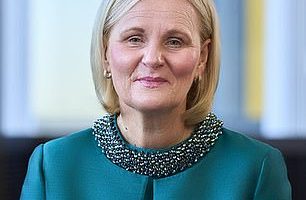
Mortgage interest rates are rising amid rocketing inflation, driving up monthly costs for many new homebuyers, those remortgaging and customers on variable rates.
But while the expense will be greater overall, new research has suggested that mortgage customers are now less likely to pay arrangement fees – and if they do pay them, they will likely be lower.
The average fee currently charged on a fixed-rate mortgage deal is £1,057 – a fall of £18 annually, according to financial comparison website Moneyfacts.


Contrast: While mortgage rates are climbing, the arrangement fees charged are going down
In addition, the proportion of fixed-rate mortgages that don’t charge a fee has risen from 35 per cent in June 2021 to 40 per cent at the start of June 2022.
This is Money answers some of the most common questions about mortgage arrangement fees, and finds out what is behind the recent fall.
What are mortgage arrangement fees?
Arrangement fees – also known as product fees – are up-front charges levied by banks and building societies when they give a customer a new mortgage, though they can often be added to the loan.
They range from just under £300 to more than £1,500.
Not all mortgages have arrangement fees, but ‘fee-free’ mortgages traditionally have higher interest rates than ones that do charge fees.
That gap appears to be narrowing, however. The rate gap between average fixed rates with and without a product fee is currently at 0.03 per cent, according to Moneyfacts, compared to 0.21 per cent a year ago.


Do the sums: Paying a fee when you don’t need to may seem counter-intuitive – but borrowers should crunch the numbers, as doing so could mean their mortgage costs less overall
Rachel Springall, finance expert at Moneyfacts, says: ‘Mortgage rates may be on the rise but it’s not all bad news for borrowers as they can still find an abundance of options to help them save on the upfront cost of their deal.
In practical terms, mortgage fees are used to cover lender’s administrative costs, such as marketing and underwriting the mortgages – but those who pay them and those who don’t won’t see any change in the way their mortgage application is serviced.
There’s no real difference between a mortgage with an arrangement fee and one without.
Should I take a mortgage that charges a fee?
It depends on several things, including the size of your mortgage; the exact rate gap between the fee-charging mortgage and comparable fee-free ones you would otherwise apply for; whether you have the money to spare; and how quickly you could pay the fee.
Nicholas Mendes, mortgage technical manager at broker John Charcol, says: ‘Put simply, arrangement fees often allow a customer to get a cheaper rate on their deal.
‘A lender will charge a fee at the beginning of the mortgage for the product, and this will be reflected in the rate and subsequently the monthly payments.
‘Typically, a five-year fixed will have attached a £995 fee across most lenders, over the course of five years the reduced monthly payments rate would be a saving against a non-fee mortgage, covering the £995 and more, making an overall saving.’
However, this isn’t always the case – especially for borrowers who are not able to pay the fee upfront.
If you choose to add the fee in to the total loan amount, then interest will be charged on it – which could wipe out the saving.
Hina Bhudia, partner at Knight Frank Finance, says: ‘When you add a fee to the mortgage it is spread over the cost of the term of loan, therefore it ends up costing you more in the long run.
‘If you are in a position to pay it upfront then we would always advise you to do so.
‘Clients that aren’t able to pay the fee up front can add it to the mortgage and once the loan is issued, provided they have agreed an option to overpay, they can choose to clear it when it suits them.
‘In addition It is also common that banks allow up to two weeks for the fee to be cleared without it affecting your overpayment allowance.
When taking out a mortgage, borrowers are often advised to factor in any fees when calculating their monthly payments – allowing them to see the ‘true’ cost of the mortgage, as a higher-rate mortgage with no fee may work out cheaper than one with a tantalising cheap rate, but a hefty arrangement charge.
You can compare different mortgages and weigh up the cost of rates and fees using This is Money’s mortgage calculator.


Counting the cost: For those who typically remortgage every two years, paying an arrangement fee each time can start to add up
It is also a good idea to think about how often you might remortgage. If you typically favour two-year fixes, paying £1,000 every other year starts to feel like a lot of money.
And arrangement fees don’t change depending on the size of the mortgage, so for someone paying off a smaller loan the fees will account for more of their total payments.
Adrian Anderson of property finance specialist Anderson Harris says: ‘Paying a fee each time you re-mortgage can add up especially if the mortgage loan size is low.’
Why are fees falling?
The drop in mortgage fees has happened in tandem with the recent rise in mortgage rates, which has happened due to several successive increases in the Bank of England’s base rate as it attempts to battle rising inflation.
Over the past 12 months, the highest average arrangement fee recorded by Moneyfacts was in September 2021 at £1,090), around the time there were several lenders offering fixed mortgages with record low rates of less than 1 per cent.
That figure was just £16 shy of the all-time record for the average mortgage fee, recorded in August 2012 and clocking in at £1,106.


Draw: With rates on the rise, some lenders are using lower fees to help them attract customers
As mortgage rates rise, some experts say that banks and building societies are offering lower fees as a carrot to try and draw in customers ahead of their competitors.
‘I suspect given the direction mortgage rates are going in, lenders have tried to reduce some of their product fees, where they can,’ says Rosie Fish, Mortgage Expert at online mortgage company, Habito.
‘As interest rates have gone up this year, lenders will have also wanted to improve the positioning of their mortgage deals on online comparison tables. Lower-fee deals will surface better in search results when someone filters for “overall cost”.
What happens if the mortgage doesn’t go through?
At the moment, some borrowers coming up to a remortgage are seeking to lock in their new deal a few months ahead of time, in the hope that they will shield themselves against further rises.
Most remortgages can be agreed three or even six months ahead of the end date, so this is something worth looking into.
But some might be concerned about paying the arrangement fee, then later deciding they aren’t going to go ahead with that particular mortgage – for example if rates started to fall, instead of rising.
Those in this position should check their lender’s terms and conditions carefully, but in general it is usually possible to get back the fee.
Anderson says: ‘Most lenders will refund the product fee if you do not go ahead. When applying for a mortgage, check this – and if you are concerned you could consider adding the fee to the mortgage when the application is submitted.’










